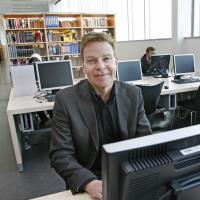We use cookies on this website. Cookies help us deliver the best experience on our website. Read about cookies.
-
- Education
- Education
- Programmes and courses
- Applications and admissions
- Tuition fees
- Scholarships
- Exchange studies at Malmö University
- Study Guidance
-
- After admission
- After admission
- Moving to Malmö
- Pre-orientation
- Arrival guide
-
- About studies at Malmö University
- About studies at Malmö University
- Why choose Malmö University
- Understanding university studies
- Connect with current students
On the page -
- Research
- Research
-
- Doctoral studies
- Doctoral studies
- Doctoral courses
-
- Doctoral schools
- Doctoral schools
- Education, Learning and Globalisation
- Doctoral school: Learning in Multicultural Societal Contexts
- ComBine
- Swedish National Graduate School in Science and Technology Education Research
- Doctoral school: Relevancing Mathematics and Science Education (RelMaS)
- Doctoral school: Sustainable Movement Education
- Finding ways in a time of great future challenges (FinnFram)
- Doctoral school: Pedagogy and Vocational Skills
- Doctoral school: Culturally Empowering Education through Language and Literature
- Research subjects
-
- Research centres
- Research centres
- Biofilms Research Centre for Biointerfaces
- Citizen Health
- Imagining and Co-Creating Futures
- Institute for Urban Research
- Malmö Institute for Migration Studies
- Literacy and Inclusive Teaching
- Centre for Work Life and Evaluation Studies
- Sustainable Digitalization Research Centre
- Centre for Sexology and Sexuality Studies
-
- Research publications
- Research publications
- Search publications
- Malmö University Press
- Research events
- Participate in a research study
- Coffee Break Quiz
On the page -
- Collaboration and Innovation
- Collaboration and Innovation
-
- Areas of collaboration
- Areas of collaboration
- Muvah
- Innovation
- Collaboration with students
-
- Collaborate with researchers
- Collaborate with researchers
- Labs and facilities
- Culture collaboration
- Support Malmö University
On the page -
- About us
- About us
-
- Faculties and departments
- Faculties and departments
-
- Faculty of Culture and Society
- Faculty of Culture and Society
- Department of Urban Studies
- Department of Global Political Studies
- School of Arts and Communication
-
- Faculty of Education and Society
- Faculty of Education and Society
- Department of Childhood, Education and Society
- Department of Sports Sciences
- Department of Natural Science, Mathematics and Society
- Department of School Development and Leadership
- Department of Culture, Languages and Media
- Department of Society, Culture and Identity
-
- Faculty of Odontology
- Faculty of Odontology
- Our research
- University Dental Clinic
-
- Find and contact Malmö University
- Find and contact Malmö University
- Visit Malmö University
- News and press
- Map of the buildings (Google Maps)
- Merchandise
- Whistleblowing
- Management and decision-making paths
-
- Vision, objectives and strategy 2025
- Vision, objectives and strategy 2025
- Global engagement
- Sustainability
- Widened recruitment and participation
- Quality assurance work at the University
-
- Malmö Academic Choir and Orchestra
- Malmö Academic Choir and Orchestra
- Student work – video pieces
- Alumni & Friends
-
- Annual Academic Celebration
- Annual Academic Celebration
- Academic traditions
- Meet our new professors
- The University in a troubled world
On the page
Lack of vision for Swedish schools, an academic reflects on PISA results

Anders Jakobsson, professor of education, does not believe that the pandemic is the main reason for the poor results.
The results of the PISA report show a broad decline in knowledge for Swedish students. "I cannot see any planned measures that could change this development," says Anders Jakobsson, a professor at Malmö University.
PISA is an international study that measures 15-year-olds' knowledge in mathematics, reading and science. The results for 2022 were presented on Tuesday and show a decline in many areas for Swedish students compared to 2018.
... you have to do something about the increasing school segregation if you want to solve the problem.
Professor Anders Jakobsson
“It is a depressing picture that follows a pattern we have seen for a long time, a decline in all subjects. During the 80s and 90s, we had a world-leading schools, both in terms of results but also in compensating the socio-economic background of the students. We lack a description of objectives and visions of how to get back to such a position. Neither politicians nor the National Agency for Education can provide that picture,” says Anders Jakobsson, a professor of education.
Swedish results in maths and reading comprehension are back at the same level as the low point in 2012.
“One of the more serious issues is that around a quarter of pupils are performing below the pass mark. I see this as extremely serious for a modern knowledge-based society. It could have important knock-on effects for Swedish society in the future.”
The National Agency for Education points to the pandemic as a likely cause of the deteriorating results. They also see the large differences between pupils with different socio-economic backgrounds, where pupils with lower socio-economic backgrounds perform less well.
“The trend of reduced equivalence has not changed. You can point out that the pandemic probably has some effect, but it does not seem to be different in Sweden compared to other countries because we kept the schools open more than in other countries. I've been saying the same thing since 2009, you have to do something about the increasing school segregation if you want to solve the problem. The countries with the highest results also have very low school segregation," adds Jakobsson.
Text: Marc Malmqvist
Share Article
